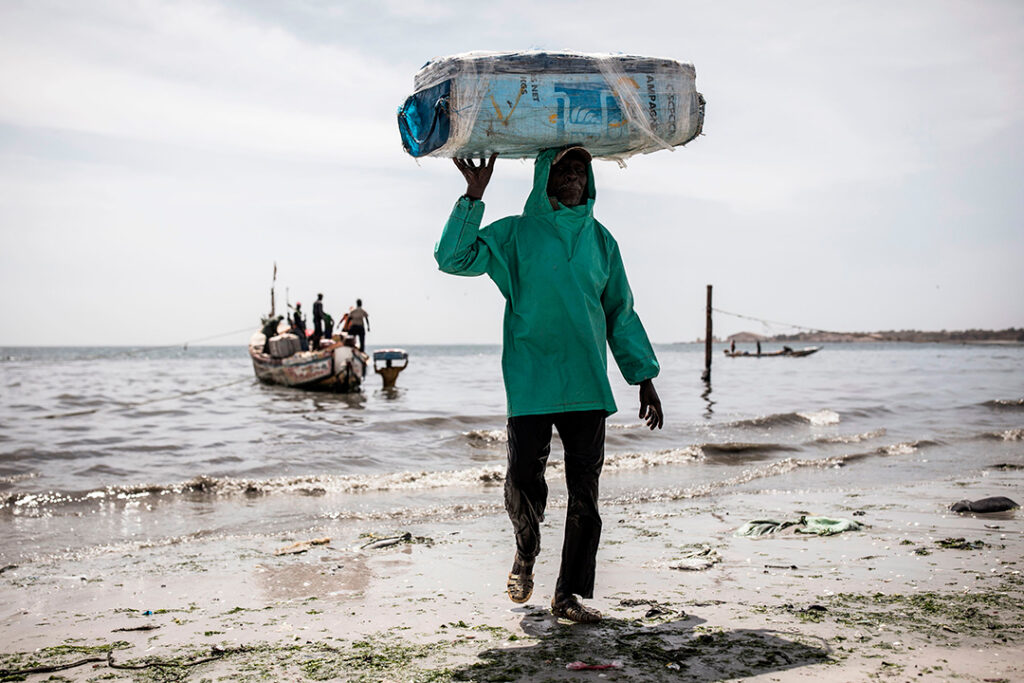ADF STAFF
A pioneering oceanographer called on world leaders to ban industrial fishing in international waters to preserve fish populations and sustain the livelihoods of small fishing communities.
Sylvia Earle, 86, made the comments during Cop26, an annual United Nations conference on climate change in Glasgow, Scotland, in November.
“Only a small segment of the human population truly relies on ocean life for sustenance,” Earle said in a report by British newspaper The Guardian. “Many more rely on it for money, using wild animals as a source of revenue.”
Earle’s words resonated in Africa, where illegal fishing is taking a major economic and environmental toll. The practice threatens the livelihoods of millions of people who work in fisheries sectors. Although a total ban is unlikely, curtailing industrial fishing could reverse some of these declines.
“Instead of being caught by a dozen countries on the high seas, the harvest could be more equitably shared,” marine biologist Daniel Pauly said in an earlier interview. “If the catch were not being made by these foreign fleets, it would be made by coastal countries.”
China has the world’s largest distant-water fishing (DWF) fleet and has targeted West Africa for years. Chinese industrial trawlers are notorious for illegally fishing in protected waters and using a range of illicit tactics to catch far more fish than allowed. China is the world’s worst illegal, unreported and unregulated (IUU) fishing offender, according to the IUU Fishing Index.
China and Taiwan represented almost 60% of all global DWF activities in other countries’ waters from 2015 to 2017, with Japan, South Korea and Spain each representing about 10% of the DWF fishing, according to a report by the Stimson Center, a think tank.
China’s DWF fleet began casting nets around the globe after the country overfished its own waters, which didn’t quell its hunger for seafood. The nation of 1.4 billion people consumes 38% of global fish production and has one of the world’s highest consumption rates of fish and seafood at 37.8 kilograms per person annually, according to a Foreign Policy report.
Running Out of Fish
Illegal marine trade costs West Africa almost $1.95 billion across the fish value chain and $593 million per year in household income. IUU fishing in the region has also been linked to other crimes such as piracy, kidnapping and drug trafficking.
Generations of Senegalese have relied on fishing-related activities for food and income, but 90% of the nation’s fisheries now are fully fished or facing collapse, according to the U.N. Senegal’s fish are mostly caught by large Chinese trawlers and exported to Asia and Europe, often as fishmeal or fish oil produced at Chinese-owned factories.
In Ghana, illicit fishing threatens to destroy small pelagic fish populations, such as sardinella, which has dropped 80% in the past two decades, the Environmental Justice Foundation reported.
Ghana’s marine fisheries support the livelihoods of more than 2.7 million people — almost 10% of the population. More than 100,000 fishermen and 11,000 canoes operate in the country, but due to overfishing and IUU tactics, average annual income has dropped up to 40% per artisanal canoe in the past 15 years or so, according to the foundation.
African nations can be more proactive in combatting sea crimes by joining World Trade Organization negotiations to end fishing subsidies and cooperating with one another to end IUU fishing, researchers at the Institute for Security Studies (ISS) in Pretoria, South Africa, argued in a recent report.
The ISS report noted that the Economic Community of West African States and the Sub-Regional Fisheries Commission and the Fisheries Committee for the West Central Gulf of Guinea have made progress in the fight against maritime crimes.
Additionally, nations that “robustly enforce” the Food and Agriculture Organization Agreement on Port State Measures (PSMA) effectively deter illicit fishing activities by denying illegal vessels port access and restricting their access to international markets, the ISS report said.
“Encouragingly, 12 out of 27 African state parties to the PSMA are from West Africa,” the ISS researchers wrote. “To have a genuine impact though, Nigeria — a major regional player — must also ratify the agreement.”

